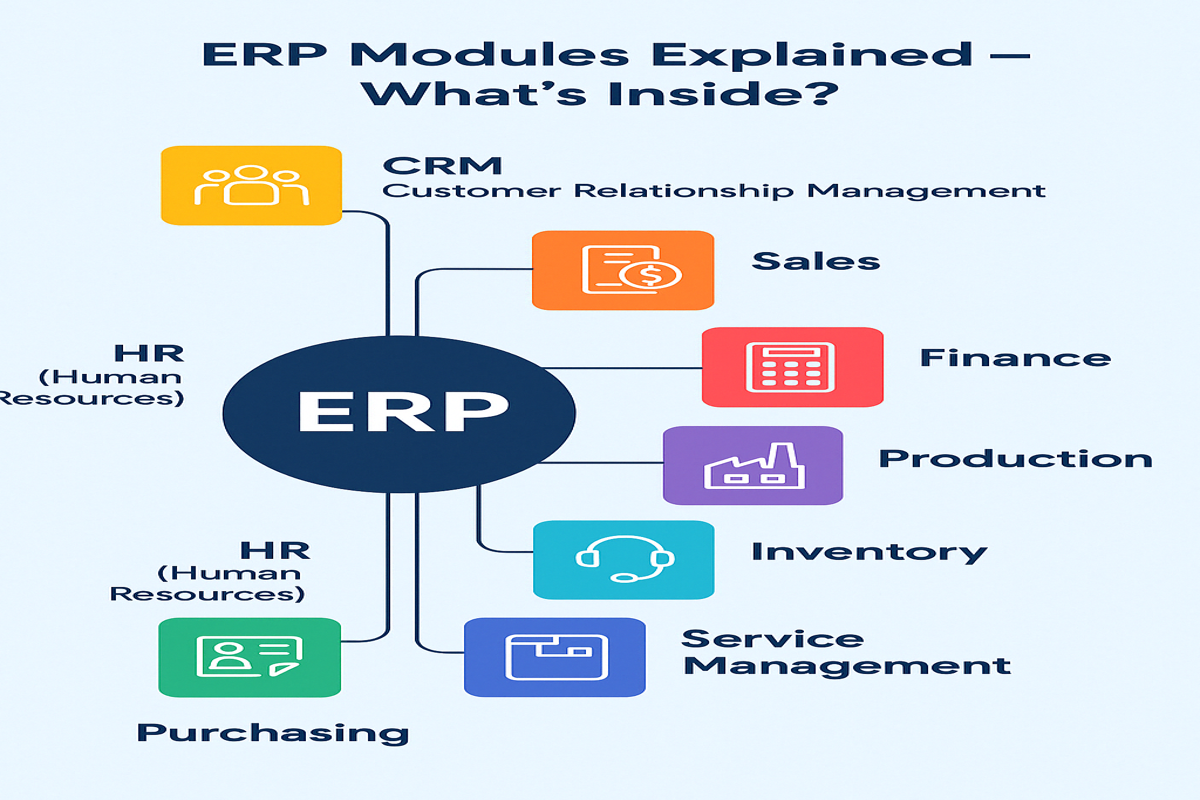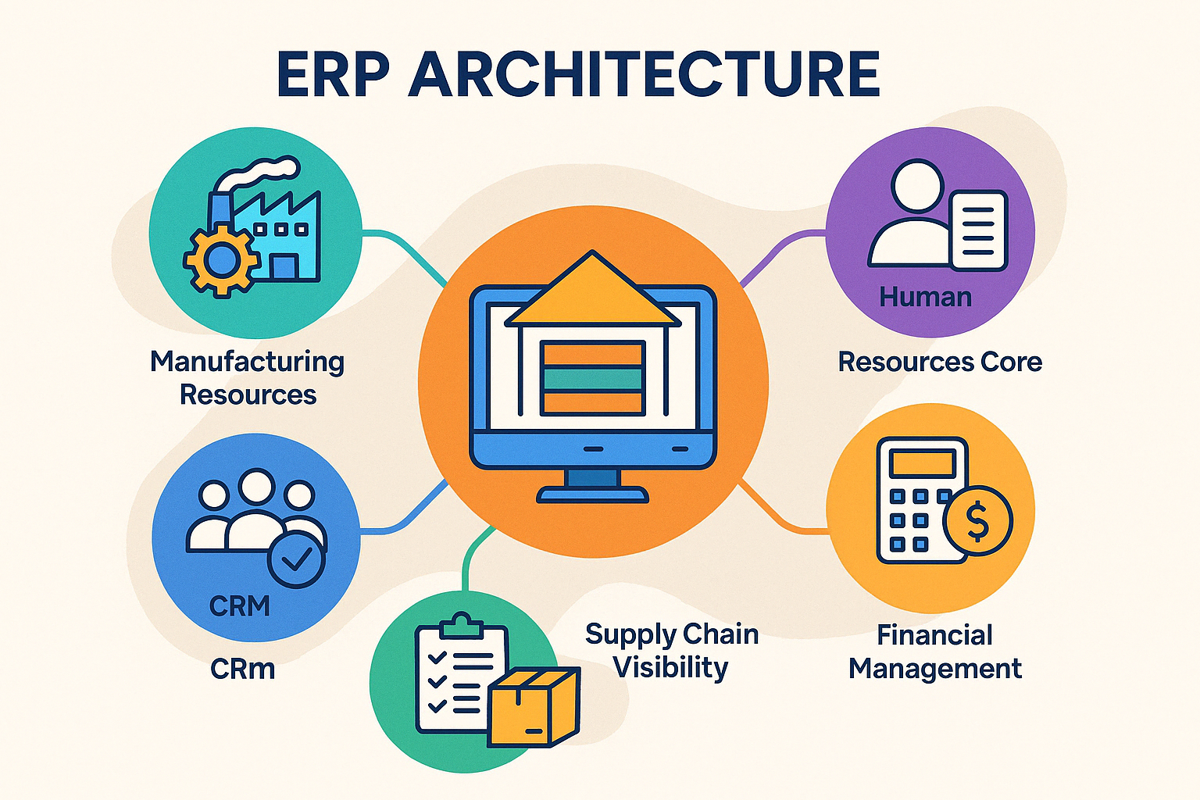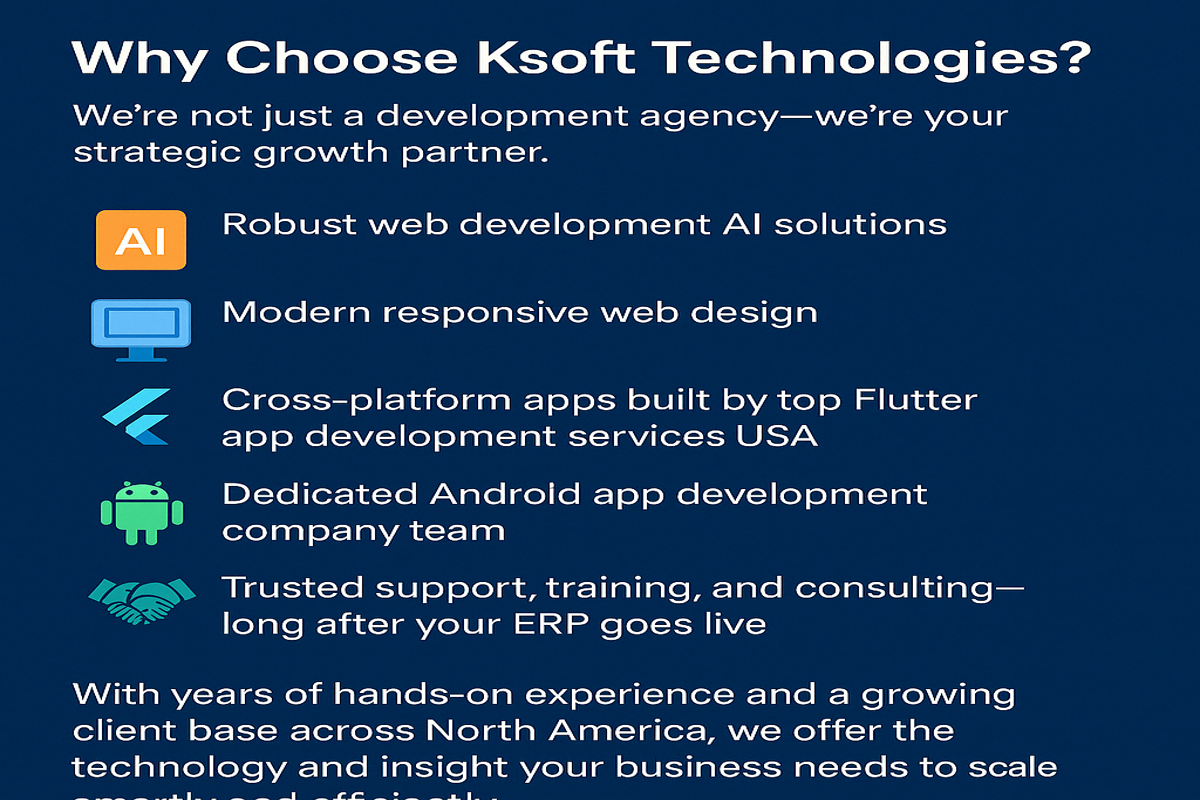Running a business is tough—especially when every department is using a different system to manage sales, inventory, customer support, and payroll. Things get messy, fast. That’s why more and more businesses are turning to custom ERP systems to bring everything together in one place.
At Ksoft Technologies, we help companies across the USA and Canada build ERP platforms that actually fit their business. Not some one-size-fits-all solution—but software that works the way you do.
In this blog, we’ll walk you through what ERP really means, why it matters, and how to create a custom solution that saves time, cuts costs, and helps your business grow—step by step.
Let’s get into it.
Getting Started: Why ERP Matters
ERP isn't just a piece of software—it's a business transformation engine. It connects all your departments into a single platform, creating seamless data flow across your company. Whether you're in manufacturing, retail, eCommerce, logistics, or services, a custom ERP can unlock operational clarity, boost team productivity, and enhance customer experience.
Unlike off-the-shelf tools, a custom ERP gives you total control—designed exactly for how you run your business.

Let’s break down the essential modules that make up a powerful ERP system. Each plays a unique role and can be customized to match your specific business workflows.
This module helps track leads, manage customer communication, handle follow-ups and complaints. Think of it as your digital brain for managing relationships. You’ll never miss a follow-up again, and your team can see all customer history in one place.
Create quotations, process orders, generate invoices, and track sales pipelines effortlessly. Sales forecasting becomes more accurate, and automation helps your team close deals faster while staying organized.
Handle accounting, taxes, expense reports, and profit & loss tracking. This module reduces manual work, eliminates spreadsheet errors, and ensures compliance with audits and financial regulations.
Ideal for manufacturing businesses, this module handles raw material management, production scheduling, tracking progress, and identifying delays. It ensures your production line operates efficiently and cost-effectively.
Know your stock levels in real-time. Manage reorders, reduce overstock, and ensure nothing is out-of-stock when you need it most. This module is crucial for eCommerce and custom development companies managing physical products.
Log customer complaints, assign support tickets, and automate resolutions. Customers get faster support, and managers can track agent performance and case history.
Covers employee onboarding, attendance, payroll, benefits, and performance reviews. It saves hours of manual work and provides a centralized HR hub that scales with your team.
Manage suppliers, contracts, purchase orders, and prices. Automate order alerts and gain better insights into vendor performance and pricing trends.
With all these modules working together, your business runs smoother, faster, and more predictably.
Why not just buy a ready-made ERP? Because off-the-shelf software can’t understand your business like you do. Here’s what a custom ERP helps solve:
Custom ERP breaks down communication walls. Marketing talks to sales. Sales updates finance. Everyone works in sync, not in silos.
You can now allocate time, labor, and capital more effectively. See what’s overused, underutilized, or misaligned—then fix it fast.
With custom software development services, your ERP does exactly what you need. No unnecessary features. No bloated dashboards.
Moving from spreadsheets or outdated tools? A custom ERP streamlines that transition, letting you retain historical data and move into a modern, cloud-based system.
Want to connect your ERP with eCommerce websites, WhatsApp, Slack, or APIs? Custom solutions give you the freedom to integrate seamlessly.
Add user roles, fields, custom reports, or update dashboards—all without writing code. That’s true flexibility.

Think of your ERP as a house. You don’t see the beams and wiring, but it’s what keeps the system working. Here’s how ERP architecture is designed:
Tracks every stage of production—from raw materials to finished goods. Automates inventory pulls and aligns with production schedules.
Handles everything from recruitment to payroll and performance management. Integrated systems mean zero duplication and consistent employee records.
Real-time accounting, tax compliance, budgeting, and audit reports—all from a single dashboard. Make smarter financial decisions, faster.
This builds lasting customer relationships. Automate follow-ups, gain insights on customer behavior, and improve retention.
Track the journey from supplier to warehouse to delivery. Your logistics team can reduce lead times and respond to issues instantly.
No two companies are alike. That’s why we design ERP systems that mirror how your business works today and how you want it to scale tomorrow.
Be clear about your goals. Do you want to reduce approval times? Improve customer response? Automate finances? Having a focused objective helps align design decisions.
Map the interactions between departments—who initiates processes, who approves, and what data flows between them. This becomes your ERP roadmap.
You don’t need every module on Day 1. Focus on essentials first. You can always add more as your business grows.
Cloud hosting offers flexibility, backups, and access anywhere. On-premise gives tighter control. We help you choose the model that best fits your data strategy.
At Ksoft Technologies, we follow a structured process to create reliable, high-performance ERP systems. Here’s how we do it:
Interview each department and list all the bottlenecks and inefficiencies. These pain points become your core ERP requirements.
Without support from leadership, ERP adoption fails. Make sure executives are engaged from the start—they set the tone for the rest of the company.
Pick between SaaS, private cloud, or in-house servers. Each has trade-offs in terms of cost, control, and maintenance.
Create flowcharts, architecture diagrams, and user journeys. This ensures everyone—from your team to the developers—stays on the same page.
ERP development isn’t a job for amateurs. Our team includes the best software developers USA who understand both business logic and code.
Include costs for licenses, development, third-party tools, integrations, user training, ongoing support, and even potential downtime. A detailed budget prevents surprises later.
Still unsure whether to invest? Here’s what you gain:
Every team works in harmony, with real-time access to the same data. No miscommunication, no duplicate work.
Dashboards and analytics let you track KPIs across sales, finance, HR, and operations. Make decisions faster—with better insights.
Set custom access levels, use encrypted backups, and ensure data compliance. Especially important if you’re in a regulated industry.
Automated tasks save time and reduce errors. From invoices to HR requests, processes that once took hours now take minutes.
Work from anywhere—office, home, or even the beach. With secure cloud access, your team stays connected and productive.
Use built-in alerts, reminders, and notifications to keep teams in sync. Collaboration improves when the right info reaches the right person at the right time.
Start small and scale big. As your business grows, your ERP grows with it—add users, departments, or even locations without re-building.

We’re not just a development agency—we’re your strategic growth partner.
As a professional website design company and custom CRM development company, we serve clients across the USA and Canada with:
With years of hands-on experience and a growing client base across North America, we offer the technology and insight your business needs to scale smartly and efficiently.
Final Thoughts
A custom ERP system is more than just software—it’s a long-term investment in your company’s future. When designed the right way, it streamlines your daily operations, improves accuracy, sharpens decision-making, and sets your business up for scalable, sustainable growth.
It also gives you a competitive edge—because while others are juggling spreadsheets and disconnected tools, you’ll be running a connected, efficient operation powered by data. Plus, with the right development partner, your ERP can evolve as your business evolves—adding new features, workflows, or integrations as needed.
At Ksoft Technologies, we don’t just build ERPs—we help you build a smarter, faster way of working. Whether you're a startup founder, business manager, or CTO, there’s no better time than now to explore what a custom ERP can do for you.
Let’s create something powerful together.
📞 Visit us at www.ksofttechnologies.com
